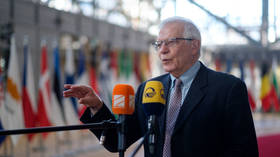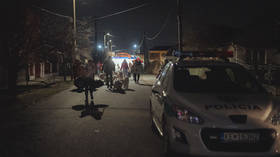Ukraine’s EU membership ‘not on the agenda’ – Borrell

The European Union’s High Representative for Foreign Affairs Josep Borrell said on Monday that membership for Ukraine is currently “not on the agenda,” with the Russian offensive a more pressing issue. Earlier, President Volodymyr Zelensky asked the EU for Kiev's “immediate accession.”
Speaking before a meeting of the bloc’s defense ministers, Borrell told reporters that his immediate focus was to “provide an answer for the coming hours, not the coming years.” While he did not rule out membership, Borrell said that providing military assistance to Ukraine was a more pressing issue, describing Russia’s military attack as “an existential threat” to Europe.
Hours beforehand, Zelensky urged the union to grant the “immediate accession of Ukraine via a new special procedure.” In a video address, Zelensky said that “our goal is to be together with all Europeans and, most importantly, to be on an equal footing. I’m sure it’s fair. I’m sure it’s possible.”
On Sunday, EU Commission President Ursula von der Leyen said that there is a “process with Ukraine that is, for example, integrating the Ukrainian market into the single market,” adding “they are one of us and we want them.”
Several EU states, among them Poland, Hungary, and Lithuania, have signaled their support for Ukraine’s EU accession.
Ukraine’s membership in the union, however, has caused divisions in the country before, and helped precipitate the current conflict. When democratically-elected President Viktor Yanukovych refused to sign an accession treaty with the EU in 2013, mass protests broke out and with the support of the US, Yanukovych was deposed a year later and pro-Western leader Petro Poroshenko took his place.
Following Crimea’s rejoining of Russia by referendum, Poroshenko ordered a massive military offensive against the breakaway republics of Donetsk and Lugansk. The conflict in these regions, which collectively make up the Donbass, continued at low intensity for eight years, until Russian President Vladimir Putin recognized their independence last week, immediately before launching a large-scale military operation in Ukraine.













